Local history: ‘Hee Haw’ star Grandpa Jones got his start on Akron radio
Marshall Jones was a young man who aged prematurely. For gosh sakes, he became a grandfather at age 22.
The former Akron resident found national fame as a radio personality, touring musician, recording artist, comedian and country star. Television audiences knew him as “Grandpa Jones” from “Hee Haw.”
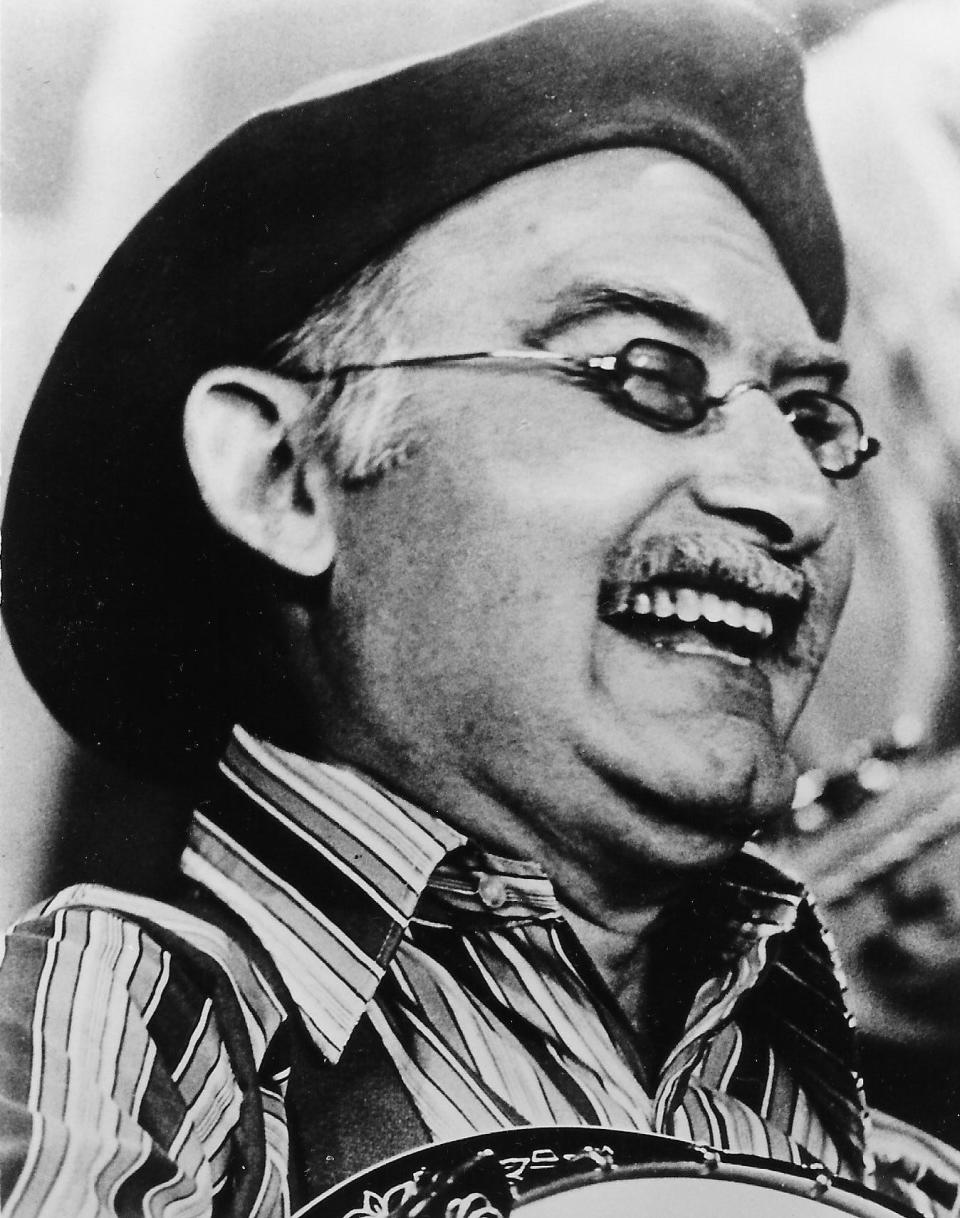
Jones enjoyed nearly 70 years in show business after beginning his career on Akron radio as a teenager in 1929. He lived here for about 10 years.
“I knew Akron like a book then,” he recalled decades later.
Louis Marshall Jones, the youngest of 10 children, was born Oct. 20, 1913, to Arcadia and David Clinton Jones on a sharecropper farm in Henderson County, Kentucky, near the Ohio River.
His family moved to the Rubber City in the 1920s. It was tough to keep up with the Joneses. They changed addresses a lot.
They lived on Westwood Avenue, Beck Avenue, Douglas Street and South Maple Street, all near Five Points. In addition to his parents, Marshall shared a house with brothers Aubrey, Spurgeon and Eugene, sister Louisa and a roomer named Rex Stephens.
Marshall was a shy, quiet boy, but his music spoke volumes. He learned to play a 75-cent guitar that his brother had given him. He took it to class as a sophomore at West High School and brought down the house when he disrupted an English lesson on Shakespeare.
He favored “hillbilly music,” as it was called then, the rollicking songs of Kentucky.
Talent show leads to radio
The kid loved going to vaudeville shows at the Albee Palace Theater in downtown Akron. Watching the comedians and musicians perform, he’d muse: “Boy, I’d like to be in that vaudeville.”
Little did he know that he’d soon perform on that stage. In 1929, he entered a talent contest at the Palace and strummed his way past 450 competitors to collect a $50 prize in gold pieces.
Jones took the money, bought a new guitar and landed gigs on local radio. He earned his first pay by doing a commercial for an Akron dentist. Billing himself as “The Young Singer of Old Songs,” he performed live on WFJA, WADC and WJW in the early 1930s.
He also moonlighted at WHK in Cleveland, co-starring with his buddy “Harmonica Joe” Troyan on the “Zeke & Harve” show.
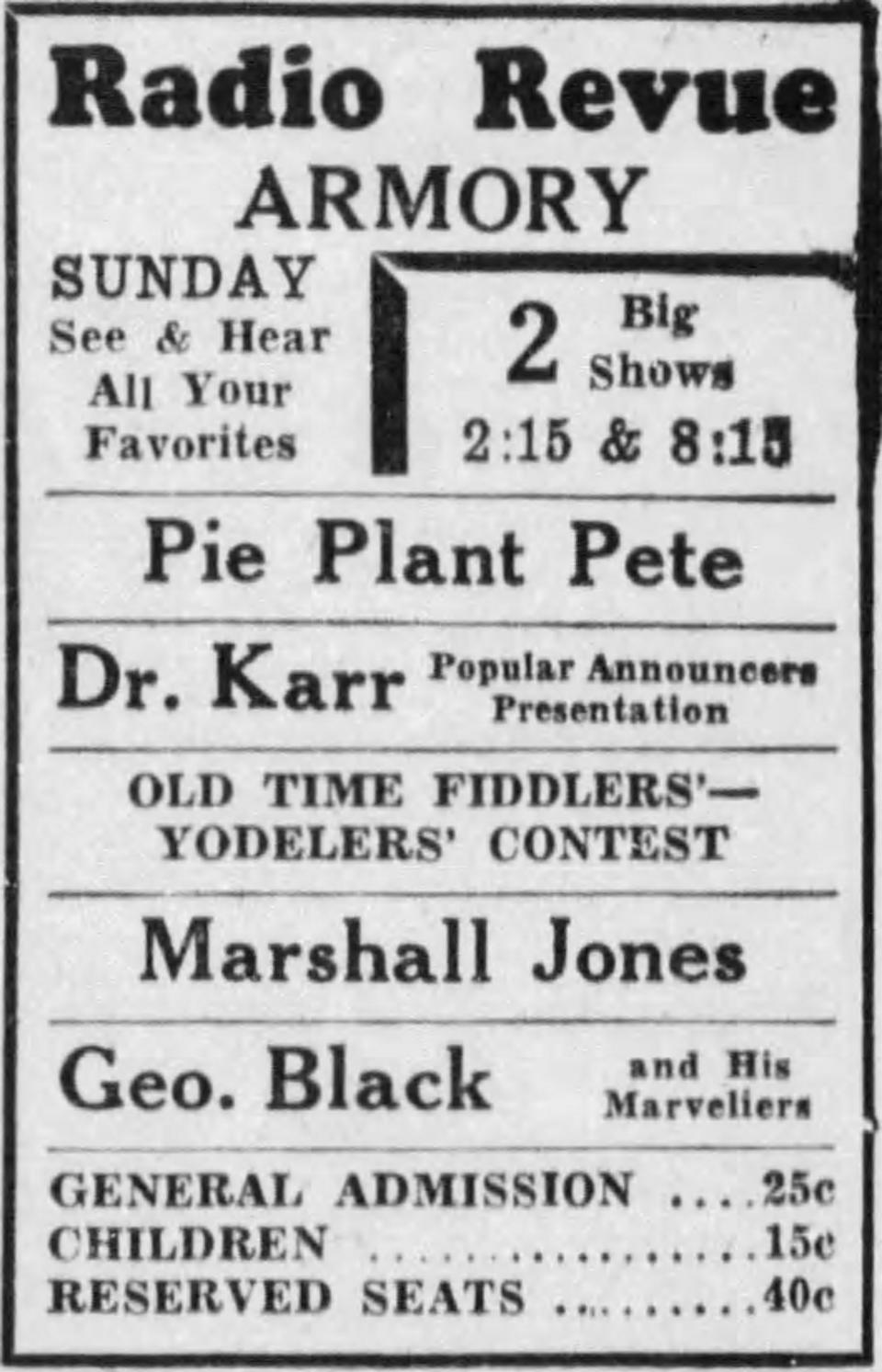
Jones played guitar anywhere he could: house parties, church socials, square dances, club meetings, store sales. He soon found himself on the bills of “radio revues” and “hillbilly jamborees” at the Akron Armory.
Recalling the Palace vaudeville shows, the musician incorporated comedy into his routine.
“I have to do that because my singin’ don’t amount to much,” he admitted.
Grandpa Jones makes debut
In 1935, he and Harmonica Joe joined folk singer Bradley Kincaid on a tour of the East Coast. Jones was 22 when he created the Grandpa Jones character on WBZ radio in Boston.
“We’d do shows at night and then come back in for a morning radio show, so we didn’t get a lot of sleep,” Jones told the Beacon Journal years later. “I was always tired, and Bradley started saying on the air, ‘Get on up here to the microphone now — you act just like an old grandpa.’
“I talked just like I do now, and people started writing in asking, ‘How old is that feller?’ He sounds like he’s about 80.’ ”
Jones dressed like a gold prospector, wearing old-time glasses, checkered shirts, suspenders, baggy pants, mountain boots, a rumpled felt hat and a fake, bushy mustache before eventually growing a real one.
In 1937, he landed a radio job in Wheeling, West Virginia, and switched from guitar to banjo (or “banjer,” as he called it in his act). Jones played the dickens out of that banjer using the clawhammer style of downstrokes. Between songs, he unleashed the corniest of one-liners with a twinkle in his eye. Just like they used to do at the Palace.
“There aren’t any new jokes,” he admitted. “Just variations of old ones.”
In 1941, Jones moved to WLW in Cincinnati, where he met his future wife, Ramona Gober, a fiddle player from Indiana. When Uncle Sam came calling, he joined the U.S. Army and performed on the Armed Forces Network in Europe during World War II.
Returning to Ohio, he married Ramona in 1946 and made a beeline for Nashville where he successfully auditioned for the Grand Ole Opry.
Grandpa Jones toured the country with Minnie Pearl, Pee Wee King and other stars. He wrote more than 300 songs and recorded on the RCA Victor, King and Monument labels. His popular tunes included “Old Rattler,” “Mountain Dew,” “Eight More Miles to Louisville” and “Tragic Romance.”
Traveling the nation, Jones said he found people to be the same everywhere he went, “except they talk a little different.” His old-style comedy won over crowds from coast to coast.
“I’ve found that if it’s a cold audience, sometimes it helps if you pick out one person that is paying attention and play just to him,” he said. “If you can get him to laughing, a lot of times it will spread to the rest of the audience.”
One of his favorite tours was entertaining U.S. troops in Korea in 1951.
“I was a little nervous,” he said. “But, boy, was it worth it. Those kids really liked it.”
Jones and his wife, Ramona, lived near Nashville, performed regularly at the Grand Ole Opry and raised three children: Eloise, Mark and Alisa.
Over the years, he aged seamlessly into the grandfather character. His kids eventually gave him grandkids.
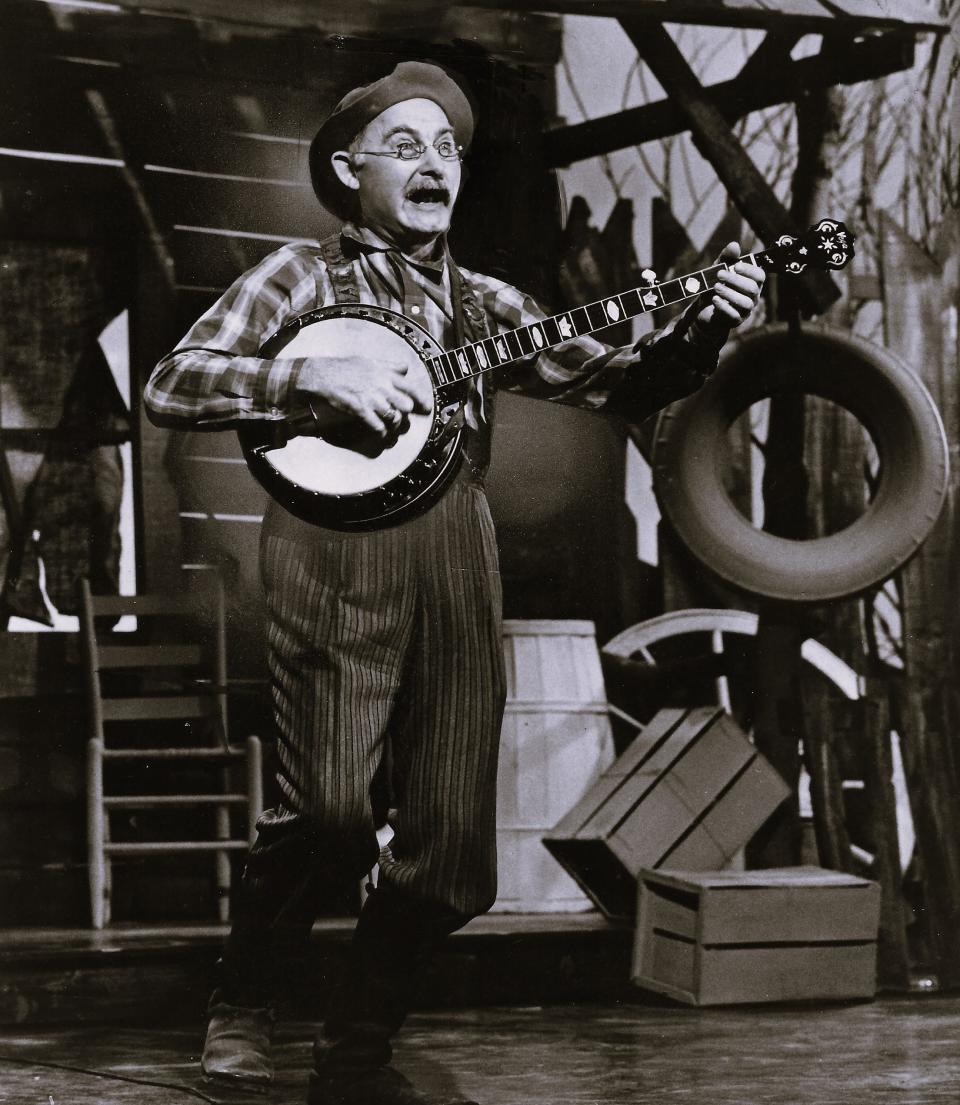
‘Hee Haw’ debuts in 1969
Television producers recruited 56-year-old Grandpa Jones to join the original cast of “Hee Haw,” a variety show that premiered on CBS in 1969 and later went into syndication.
“I thought the name was bad, but I had to swallow that,” he once told an interviewer. “It was just right for it.”
He shared the cornfield with Buck Owens, Roy Clark, Minnie Pearl, Junior Samples, Roy Acuff, Archie Campbell, Lulu Roman, Don Harron and a bevy of “Hee Haw Honeys.”
Jones appeared in comedy sketches and performed duets with his wife and others. In a recurring routine, the cast shouted: “Hey, Grandpa, what’s for supper?”
He replied in rhyme with a lip-smacking list of vittles that varied from night to night. One evening, he answered: “Cornbread, turnip greens, candied yams and butterbeans. Blackberry cobbler and all things rare, and the more to eat, the more to spare.”
The cast replied “Yum! Yum!”
Grandpa Jones returned regularly to his old neck of the woods in Ohio, performing at county fairs, the state fair and other shows. In 1975, he appeared at the Richfield Coliseum in “the biggest hootenanny ever staged outside of Nashville,” an 18-act bill headlined by Tanya Tucker and Freddie Fender.
Announcers introduced him as “everybody’s grandpa.”
Country star returns to Akron
In 1977, he headlined Yusef Khan Grotto’s “Showboat Varieties Show” at E.J. Thomas Hall in Akron. Mayor John S. Ballard proclaimed May 7 as “Grandpa Jones Day.”
He returned to the Coliseum a few months later for a Grand Ole Opry show featuring Roy Acuff, Bill Monroe, Don Gibson and Jerry Clower.
Jones visited Akron in “civilian attire.” Out of costume, he easily traveled in public without people recognizing him. He could still find his way around the old town.
“I can recognize a lot of things — after I get off these freeways,” he said. “I still got friends here, oh, yes.”
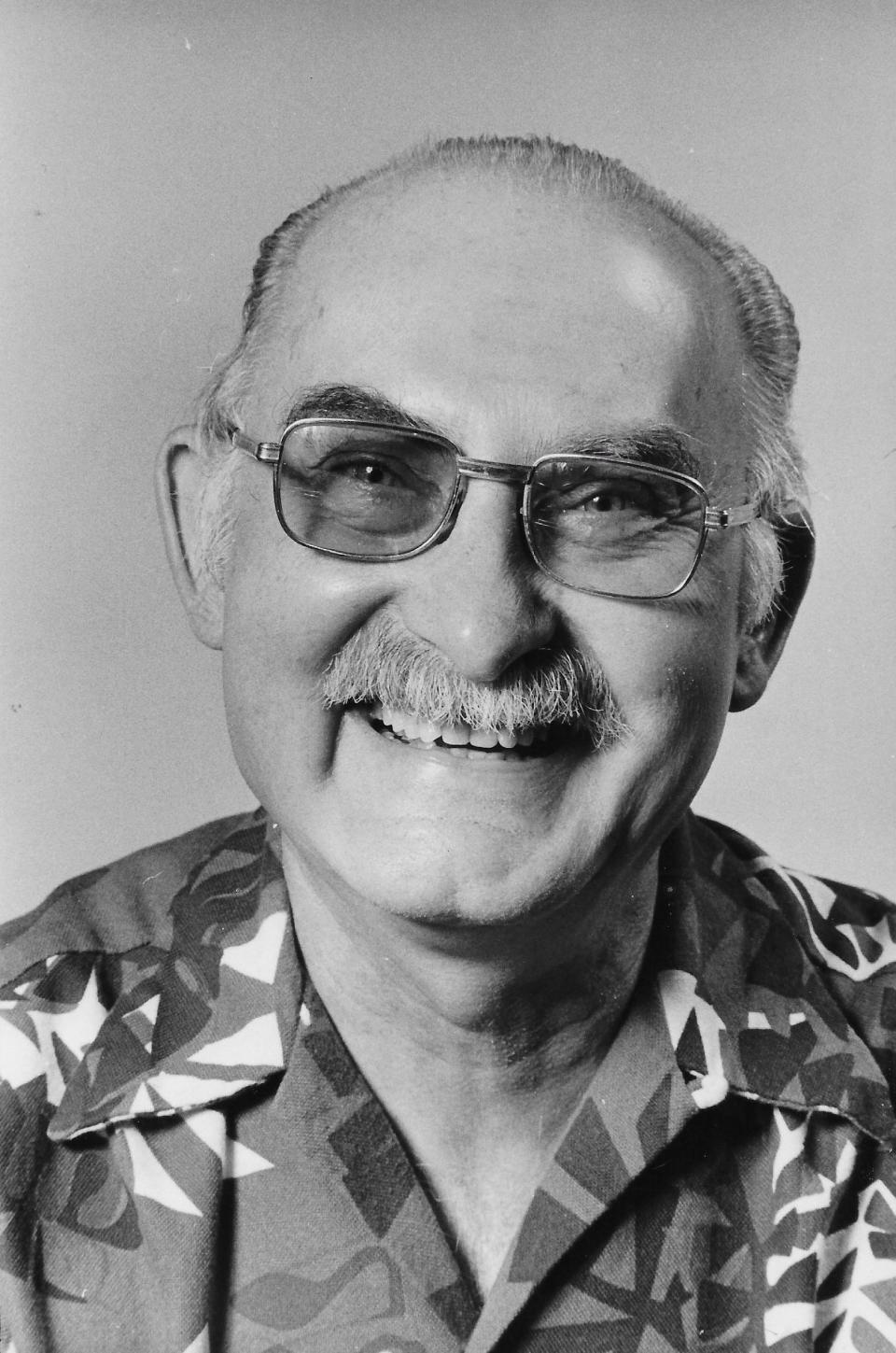
In 1978, Jones was elected to the Country Music Hall of Fame, edging out finalists Johnny Cash, Hank Snow and Vernon Dalhart. Glen Campbell introduced him at the Country Music Association Awards in Nashville.
“I never thought it would come to this,” Jones said at the ceremony.
He was inducted into the Akron Radio Hall of Fame in 1984.
“Hee Haw” ended in 1993 after 25 seasons, but continued to air in reruns and can still be viewed today on streaming services.
Grandpa Jones performed his final show at the Grand Ole Opry on Jan. 3, 1998. He suffered a stroke backstage and was taken by ambulance to a Nashville hospital. He died Feb. 19 at age 84.
The country mourned the loss of “everybody’s grandpa.”
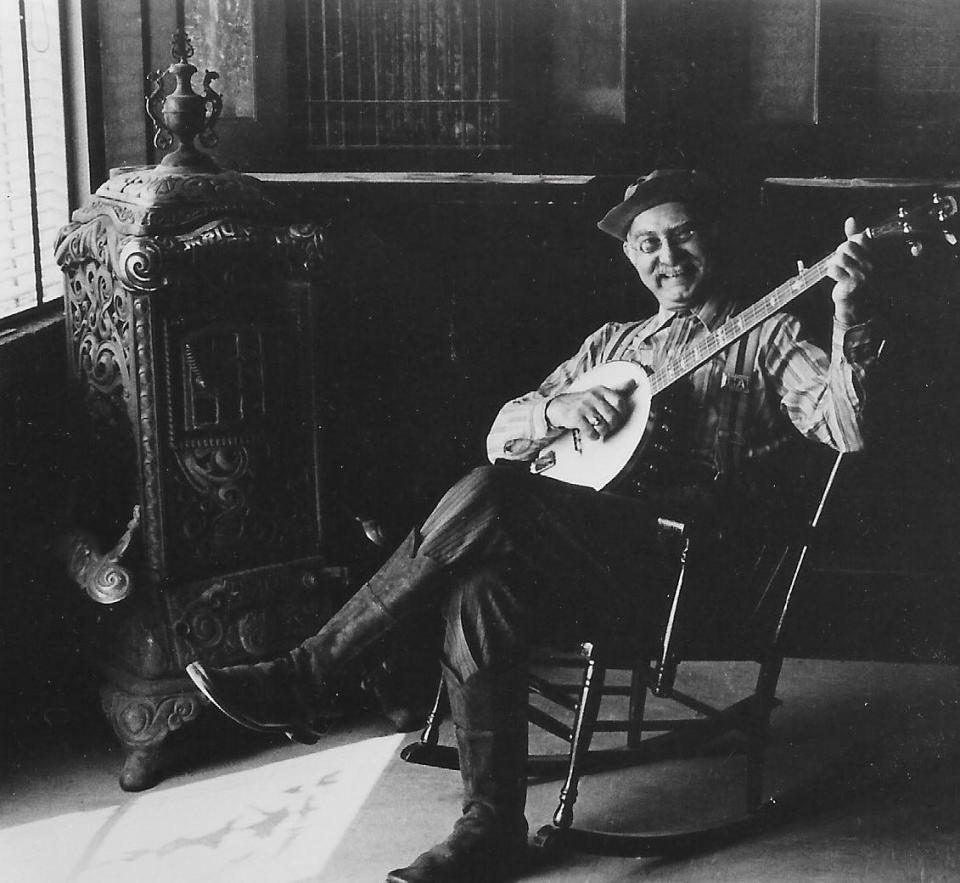
“He was a talented musician and entertainer who helped perpetuate old-time country music,” Grand Ole Opry spokesman Jerry Strobel eulogized. “He was one of the funniest souls that God created.”
Marshall and Ramona Jones are buried in Goodlettsville, Tennessee. Their monument bears plaques featuring a banjo and fiddle.
Inscribed on his side of the marker are lyrics that he wrote for the 1964 song “Falling Leaves.”
“When you leave this earth for a better home someday, the only thing you’ll take is what you gave away.”
Mark J. Price can be reached at [email protected]
Vintage photos: 50 more Cleveland TV personalities
This article originally appeared on Akron Beacon Journal: ‘Hee Haw’ star Grandpa Jones got his start in Akron
